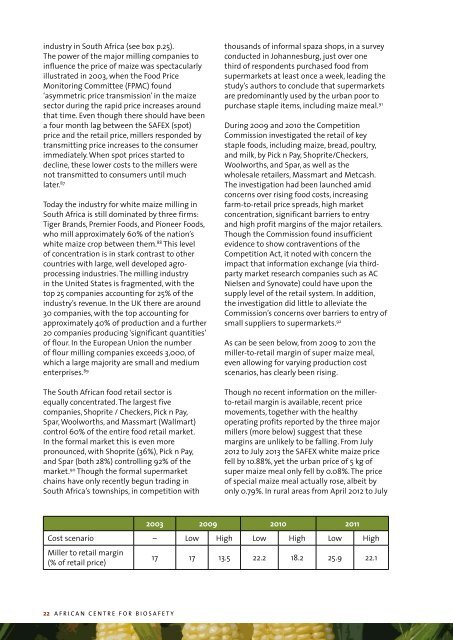GM-Maize-Report
GM-Maize-Report
GM-Maize-Report
You also want an ePaper? Increase the reach of your titles
YUMPU automatically turns print PDFs into web optimized ePapers that Google loves.
industry in South Africa (see box p.25).The power of the major milling companies toinfluence the price of maize was spectacularlyillustrated in 2003, when the Food PriceMonitoring Committee (FPMC) found‘asymmetric price transmission’ in the maizesector during the rapid price increases aroundthat time. Even though there should have beena four month lag between the SAFEX (spot)price and the retail price, millers responded bytransmitting price increases to the consumerimmediately. When spot prices started todecline, these lower costs to the millers werenot transmitted to consumers until muchlater. 87Today the industry for white maize milling inSouth Africa is still dominated by three firms:Tiger Brands, Premier Foods, and Pioneer Foods,who mill approximately 60% of the nation’swhite maize crop between them. 88 This levelof concentration is in stark contrast to othercountries with large, well developed agroprocessingindustries. The milling industryin the United States is fragmented, with thetop 25 companies accounting for 25% of theindustry’s revenue. In the UK there are around30 companies, with the top accounting forapproximately 40% of production and a further20 companies producing ‘significant quantities’of flour. In the European Union the numberof flour milling companies exceeds 3,000, ofwhich a large majority are small and mediumenterprises. 89The South African food retail sector isequally concentrated. The largest fivecompanies, Shoprite / Checkers, Pick n Pay,Spar, Woolworths, and Massmart (Wallmart)control 60% of the entire food retail market.In the formal market this is even morepronounced, with Shoprite (36%), Pick n Pay,and Spar (both 28%) controlling 92% of themarket. 90 Though the formal supermarketchains have only recently begun trading inSouth Africa’s townships, in competition withthousands of informal spaza shops, in a surveyconducted in Johannesburg, just over onethird of respondents purchased food fromsupermarkets at least once a week, leading thestudy’s authors to conclude that supermarketsare predominantly used by the urban poor topurchase staple items, including maize meal. 91During 2009 and 2010 the CompetitionCommission investigated the retail of keystaple foods, including maize, bread, poultry,and milk, by Pick n Pay, Shoprite/Checkers,Woolworths, and Spar, as well as thewholesale retailers, Massmart and Metcash.The investigation had been launched amidconcerns over rising food costs, increasingfarm-to-retail price spreads, high marketconcentration, significant barriers to entryand high profit margins of the major retailers.Though the Commission found insufficientevidence to show contraventions of theCompetition Act, it noted with concern theimpact that information exchange (via thirdpartymarket research companies such as ACNielsen and Synovate) could have upon thesupply level of the retail system. In addition,the investigation did little to alleviate theCommission’s concerns over barriers to entry ofsmall suppliers to supermarkets. 92As can be seen below, from 2009 to 2011 themiller-to-retail margin of super maize meal,even allowing for varying production costscenarios, has clearly been rising.Though no recent information on the millerto-retailmargin is available, recent pricemovements, together with the healthyoperating profits reported by the three majormillers (more below) suggest that thesemargins are unlikely to be falling. From July2012 to July 2013 the SAFEX white maize pricefell by 10.88%, yet the urban price of 5 kg ofsuper maize meal only fell by 0.08%. The priceof special maize meal actually rose, albeit byonly 0.79%. In rural areas from April 2012 to July2003 2009 2010 2011Cost scenario – Low High Low High Low HighMiller to retail margin(% of retail price)17 17 13.5 22.2 18.2 25.9 22.122 AFRICAN CENTRE FOR BIOSAFETY




